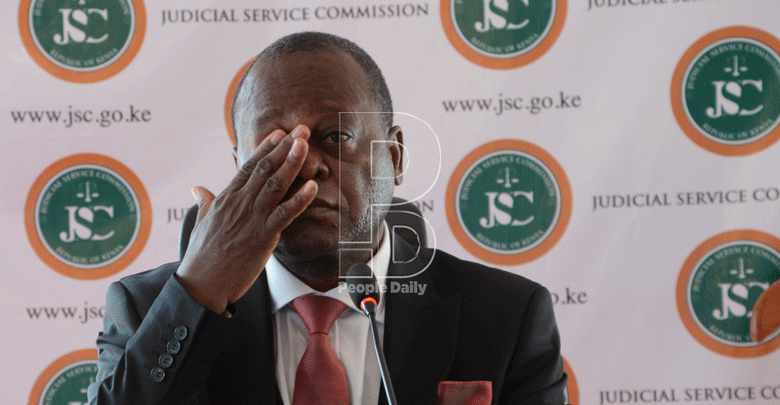Wekesa at pains to defend rugby players drug shaming
By Nancy Gitonga, April 23, 2021Law professor Moni Wekesa was yesterday at pains to explain why he named Kenya Sevens rugby players and coaches who used banned substances.
This is after Wekesa was confronted by lawyer Macharia Njeru, a member of the Judicial Service Commission (JSC) panel over a report he did when he was the chair of Kenya Anti-doping Taskforce.
Njeru wanted to know why the players were not given a fair hearing but still went ahead to condemn them.
In his defence, Wekesa said they solely relied on research after it emerged that a total of 34 athletes had tested positive for banned substances and they needed to find a solution.
He said 236 rugby players were interviewed and 78 of them said they know someone who used steroids.
“We wrote to the Kenya Rugby Union (KRU) chair to appear before us to explain the issues. But did not and sent his officials,” he said.
Samples positive
Wekesa, 62, said all samples picked had tested positive and some of the players said they were being given the substances by the coaches.
They decided to write in the report and recommend that the coaches undergo disciplinary process for being involved in doping.
During the interviews for the position of the next Chief Justice, Wekesa said if appointed, he would engage with law schools by ensuring that judicial staff voluntarily teach at least one course, run law programmes on local TV stations to enlighten Kenyans on what judiciary is doing with an aim of getting them to own the institution.
“The first thing I will do when named CJ, is mend relationships between the Judiciary and other arms of government.
The second agenda would be to build allies, to take the Judiciary to the people. At the moment law schools have better court rooms than the Judiciary,” he said.
Wekesa is currently the Dean of Law School at Daystar University, has two doctorate degrees in two different academic fields, two different Master’s degrees and Bachelor’s degrees also in two different fields.
He also told the panel that he intends to take judiciary to the public and hire musicians to sing songs about the institution and work it does.
“l will bring on board musicians to compose songs on judiciary, songs carrying the message of judiciary how to approach it, what it does, songs about disobedience of court orders with an aim of making people understand the institution well,” he said.
He said he has done a paper on use of music therapy to help improve people’s performances.
Arm of government
He believes that music changes people’s moods and helps their bodies generate hormones that make people feel good and in turn improve their performance.
“Music therapy is given to people with short attention span…Music is also used to exorcise evil spirits in some communities.”
He also noted that courts should allow other arms of government to do their work but at the same time it has to check whether what has been done is constitutional, he said.
Wekesa who has taught law for the last 10 years and described himself as a transformative leader will prioritize mending relationships between judiciary and other arms of government.
In his view, an effective judiciary is one where cases are resolved quickly and people are treated humanely.
On corruption, Wekesa said all reports he has read the vice features which points to its existence.
He added that he plans on engaging others who benefit from services of the judiciary to desist from bringing corruption to the judiciary.
“I want the people to own the Judiciary. Once we get them to own it in that manner, where they have a lot of information about it, where they are able to associate with it, where they are able to feel what it does, then should we want to know about corruption in the Judiciary, they will tell us, because they are the people.”
Wekesa also believes increasing automation of the court system will cut out some avenues of corruption.
“I have never given a bribe but have been arrested several times for traffic offences and held in cells in Kibera, Naivasha and Eldoret Law Courts.”
He said he designed the digital traffic court, which is helpful to Kenyans.
He believes this will help Kenyans pay for the traffic offence and driver once he pays penalty, he or she can be able to go in less than eight minutes
